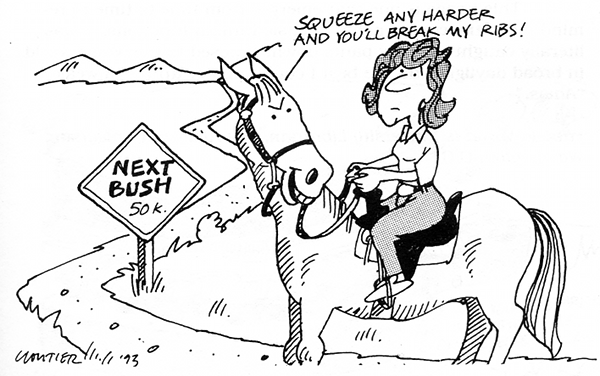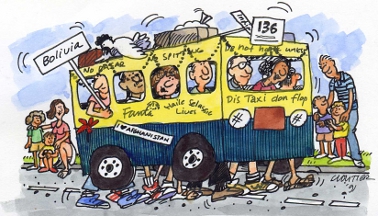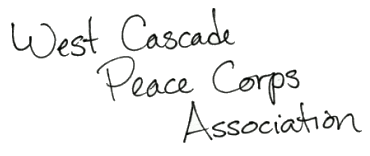Riding High
From "The Funniest Job You'll Ever Love", 2nd Edition
By Patricia Wand, Colombia (1963-65)
It was really more of a social call than actual "work" in the
sense of teaching or community development, but both Jennie
and I felt it was a commitment and that we should meet expectations. Since we had also been invited to help with a meeting in
another community, Jennie went there and I rode off on my horse
to visit the family of Anatolio Cabrera.
They were in the middle of sugar harvest, and, since
Anatolio and his brother owned their own trapiche (refinery), the
processing of cane sugar was well underway. For twenty-four
hours a day during the harvest they kept the oxen circling the
grinders and kept the pots of ever-thickening juice boiling over
the fires. The harvest lasted ten days, twice a year. The final
product was a large cube of brown, raw sugar that sold in the
marketplace at a decent price, and made the whole effort worth-
while. We had been invited to see the operation and participate
in the making of melcocha, a small candy made at a later stage of
sugar processing and which was notoriously delicious.
Buesaco, where we lived, is a village that stretches a mile
or so along either side of the Pan American Highway on a moun-
tain ridge in southern Colombia. We lived on the south end of the
village and the Cabreras lived in the countryside an hour or so
north of town.
The ride through the village in early morning was pleasant, and as I descended the road leading off the highway, I
couldn't help gasping at the beauty of the Andes Mountains. The
magnificent peaks never ceased to amaze me. Seldom did I have
an opportunity to ride alone into the countryside where I could
ponder their incredible structure and colors in solitude.
The one-lane road was chiseled out of the mountain. It
formed a curly ribbon as it followed the curves of the
mountainside: first an outside curve, then an inside curve, where
often as not a little creek trickled across it. The foliage was green
and lush but not tall. Since it was closely cropped by ever-
present livestock and carefully tended by intense farming.
I arrived at the tile-roofed adobe house by mid-
morning. We shared the customary rituals of greetings and
lukewarm coffee with a crusty roll. Because we had visited the
family before, they were comfortable allowing me into the kitchen
to chat as friends do.
After taking care of the horse, we left the house and
walked down the mountain trail to the trapiche. The men were
tired and punchy from the combination of little sleep and fermented sugar juice, but we all had a good time making melcocha.
Before I left, the women insisted on feeding me lunch at the
house. The lunch menu was thick potato soup and more coffee.
The Cabreras had no latrine, so, against my better judgment, I
decided to try to make it home before emptying my bladder.
I saddled the horse and began the journey. The usually
pleasant, rhythmic jostle became pure torture with a full bladder
and I became more and more uncomfortable. I finally decided I
had to flnd a bush. As I rounded each outside curve, I expected
to see a bush. None appeared. Sometimes a little house would
be nestled in bushes above or below the road, but there were
never bushes in solitude near the road where I could hide for a
few minutes.

I hadn't passed a living soul all day, so finally, out of
desperation, I decided to use the protection of an inside curve
where no houses were in sight. I got off the horse, looked around
one more time, and as I unzipped my jeans the thought crossed
my mind that skirts like the campesina women wear allow
squatting with modesty. But, alas, as a gringa I was permitted to
wear jeans when horseback riding and so had to suffer the
consequences.
I dropped my pants around my knees and squatted.
About halfway to total relief, I had an uncomfortable feeling that
someone was watching me. I looked around, hoping I was wrong.
Gasp! My hunch was correct! A campesino on a bicycle had just
rounded the corner and was approaching me.
The dilemma was: stay squatting or stand up and expose
my naked front side as well as my naked backside. Bodily functions did not allow me to stand up. I stayed squatting. As the
bewildered campesino passed silently by, I greeted him from my
embarrassing position with the customary, but weak, "Adios,"
and immediately turned beet red.
Finally finished, I stood, fastened my jeans, and started
laughing out loud. Only the horse and I heard, I think. I laughed
aloud again and again, each time thinking of the campesino
telling his drinking buddies and probably, someday, even his
grandchildren: "I saw the gringa's white butt!"
This image is one that emerges from time to time to remind me of the commonality of basic human functions. I was
literally caught with my pants down, exposed to the whole world
in broad daylight and the best I could muster up was a weak
"Adios."
Patricia Wand is University Librarian, The American University,
Washington, D.C.


